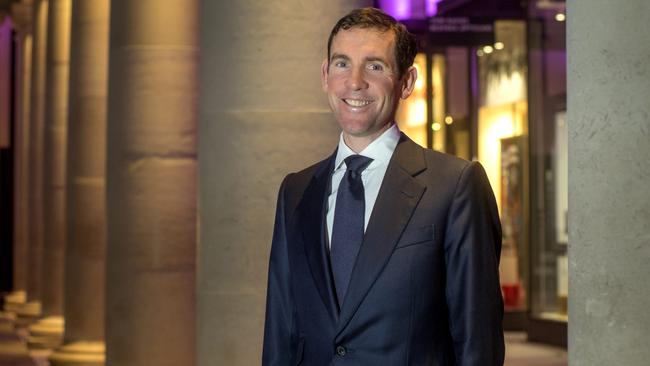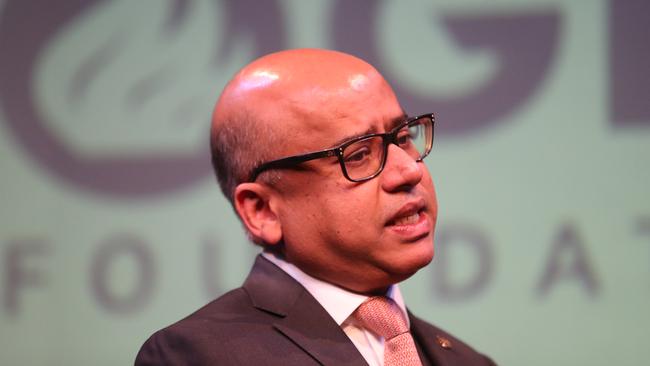
It’s not clear how much Credit Suisse thinks it is owed by Lex Greensill’s Greensill Capital, or the basis of its claim that it can seek the liquidation any of Mr Gupta’s business units — that won’t be made clear until documents filed in the NSW Supreme Court over the liquidation are released next month, after the first court hearing on May 6.
The only figure in the public domain is a $US140m ($180m) bridging loan extended by Credit Suisse to Greensill last year — partly repaid — and reports the bank may take a $US3bn hit on investment funds linked to Greensill’s supply chain financing operations, frozen when Greensill hit trouble in March, to which Mr Gupta’s GFG Alliance is said to owe $US1.3bn — but through the London-based financial services firm, not directly to Credit Suisse or the funds.
What is clear, though, is that rather than wait for an orderly process to recover its funds through the liquidation of Greensill’s assets by Grant Thornton — which would include recovery of debts owed by Mr Gupta’s GFG Alliance — Credit Suisse has pressed the big red button and declared all out war on Sanjeev Gutpa and his sprawling global empire.
Mr Gupta has so far declined to consider the sale of assets to make good on his debts to Greensill, focusing instead on attempts to refinance debts estimated at $US6bn. His detractors suggest he appears to have taken the view that his corporate empire’s debts are large enough to be the problem of his lenders, not him.
GFG’s Australian Infrabuild arm, not a target of the Credit Suisse action, is Mr Gupta’s most valuable asset. Insiders suggest it could be worth as much as $2bn, maybe more.
Credit Suisse’s threat to cut loose parts of his tightly woven and complex empire — Whyalla and Tahmoor in Australia, and Liberty Commodities in the UK — might be a ploy to shake Mr Gupta’s resistance to asset sales and force him to put Infrabuild on the market.
But it is a high risk strategy.
Infrabuild relies on Whyalla for a range of products, such as billet steel, that it can’t easily or cheaply source elsewhere.
Any threat to Whyalla is a threat to Infrabuild, the biggest source of value in the Gupta empire.
That partly explains public comments by would-be liquidator McGrathNicol that it has no intention of threatening the facility’s operations if it is installed as its liquidator by Credit Suisse.
But risks remain even if the threat is not one of closure, just the uncertainty caused by the appointment of liquidators.

Reports are already emerging that suppliers are getting nervous and demanding upfront payments for goods and services, potentially exacerbating the cash flow crunch caused by the loss of revolving credit lines offered through Greensill.
Hand Whyalla to liquidators or new owners — who may, at a minimum, seek to improve the sales terms to other parts of the Gupta empire, no longer related parties — and the value proposition for an Infrabuild sale is diminished, and that is where the real money sits.
While it might be profitable now, Whyalla remains an ageing asset that lacks the scale to compete on the global market without a substantial and costly reinvestment program, and Tahmoor is a relatively marginal metallurgical coal operation, otherwise Glencore would still own it.
On the face of it, there’s probably never going to be a better time to find a quick buyer for those assets. Iron ore is back up to around $US170 a tonne, coking coal prices are steady and steel spreads and pricing are strong — on Tuesday Credit Suisse was tipping a “stellar year” for BlueScope.
But the liquidation process won’t be quick — even the court case to appoint liquidators seems likely to take months given Credit Suisse is not, for some reason, seeking an expedited hearing.
And high iron ore prices — the key to Whyalla’s profitability — probably won’t last. At lower prices Whyalla will likely head back to Struggle Street without a major reinvestment program of the sort promised — but never quite delivered — when Mr Gupta took control of the former Arrium assets in 2017.
Credit Suisse has also inserted itself into a hot button political issue. Whyalla is a key supplier to major federal government infrastructure programs such as the $10bn Inland Rail project, and its $35bn program to build a new fleet of naval frigates.
And state and federal governments, already in talks about bailout packages for Whyalla if the worst comes to pass, are far more likely to come to the rescue of Lex Greensill — who at least gave it a crack (or said he would).
Would they also ride to the rescue of an international bank that forced Whyalla into a fresh liquidation process?
Credit Suisse is playing a high stakes game, and it’s far from clear how the cards will fall. Meanwhile, thousands of Australian workers and their families again face months of uncertainty caused by would-be moguls playing complex financial games in overseas markets.






Credit Suisse has deployed the nuclear option in its move to appoint liquidators to Sanjeev Gupta’s Whyalla steelworks and Tahmoor metallurgical coal mine.